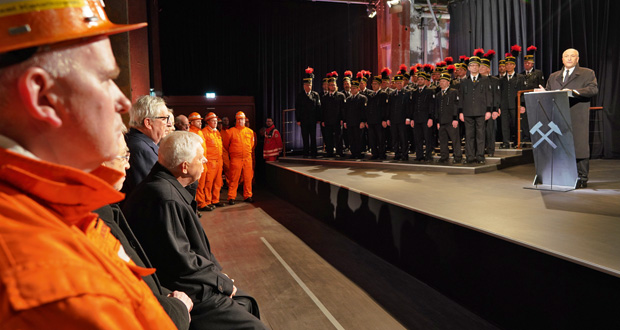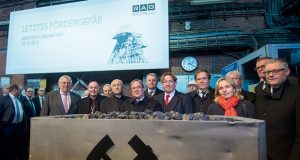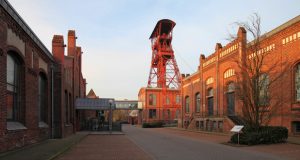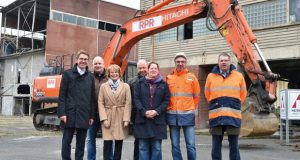Two hundred years of active coal mining in Germany came to an end on 21st December 2018 (Figure 1). The Franz Haniel shaft in Bottrop saw the very last lump of coal brought to the surface. Over 500 guests and guests of honour, including President of Germany Frank-Walter Steinmeier, President of the European Commission Jean-Claude Juncker, and Minister-President of North Rhine-Westphalia Armin Laschet, assembled at the site to witness the winding up of an industry that has been such a dominant force in shaping Germany. Turning its back on coal marks a monumental sea change for the Ruhr region.
At the invitation of RAG Aktiengesell-schaft and the RAG-Stiftung, both based in Essen/Germany, high-ranking representatives from politics, industry and commerce, trade unions and civil society attended the main send-off for the German coal mining industry, where they were able to observe this historic turning point in German industrial history first-hand.
Kicking off the event, Peter Schrimpf, CEO at RAG, made a speech that paid tribute to the many successes and achievements of the German coal mining industry. He honoured the miners in particular, whose hard work below ground he credited with making the mining regions, and Germany as a whole, what it is today. Even during the phase-out process, they remained highly motivated and focussed on their responsibilities when performing their duties, right down to the very last day. Their efforts were crucial in enabling the company to fulfil its obligations in accordance with the German Hard Coal Financing Act. Once this was complete, a ceremony was conducted at the Franz Haniel shaft in the Prosper-Haniel mine. Seven miners hauled the final lump of coal to the surface and, in a symbolic gesture, presented it to President Steinmeier, who paid tribute to the achievements of the German coal mining industry and expressed how much he respected and appreciated everything that had been accomplished.
Bernd Tönjes, CEO at RAG-Stiftung, joined him in highlighting the extraordinary successes of the miners and employees of the German coal mining industry. He also looked to the future and spoke of the need to make concerted efforts to continue rapidly progressing the transformation in the former mining regions. RAG is in charge of carrying out this work, with both companies considering the mining regions to be their responsibility beyond 2018, according to Tönjes.
In his formal address, Frank-Walter Steinmeier discussed the relevance of the coal mining industry from a national perspective. Building on this, Jean-Claude Juncker went on to explain that the industrialisation of Europe is inextricably linked to the mining of coal as an energy source. He also highlighted the important role coal has played in maintaining peace and prosperity in Europe. The European Coal and Steel Community (ECSC), which was set up in 1952, was the first supranational organisation in Europe and was the original community on which the European Union in its current form would ultimately be built.
Armin Laschet also spoke of community and cohesion. He cited the miners’ achievements, drawing attention to the significance of coal mining’s role in developing the industrial state of North Rhine-Westphalia. He also pointed out the Ruhr region’s enormous capacity for change. Once upon a time revolving entirely around the mining industry, it has since evolved into one of Europe’s most significant regions for innovation and scientific endeavour. Laschet emphasised that the state government and local players, with assistance from the German federal government and the EU, are continuing to pursue this new direction and, by hosting the Ruhr Conference, seek to spur further scientific growth and create new opportunities for the future.
Michael Vassiliadis, President of IG BCE, then took to the stage to give a speech that focussed on the role of social partnership. He referenced an oft-quoted phrase in German, “Kein Bergmann fällt ins Bergfreie” – roughly translated, this means “No miner will be abandoned”, a promise that has indeed been kept. He credited this to the social partners, and, in particular, the employees, who insisted on being shown the respect and recognition that they deserved. This sentiment was echoed by Barbara Schlüter, Chair of the Works Council working group in the RAG Group, in the final speech. She described the mining industry’s greatest legacy as being that of solidarity, camaraderie and equality – a legacy that will survive beyond 2018.
Music for the event was provided by the Ruhr Coal Choir and the WDR Symphony Orchestra. Also featured was a short film by Werner Kubny, which captured impressive scenes of an underground world. (RAG/Si.)



